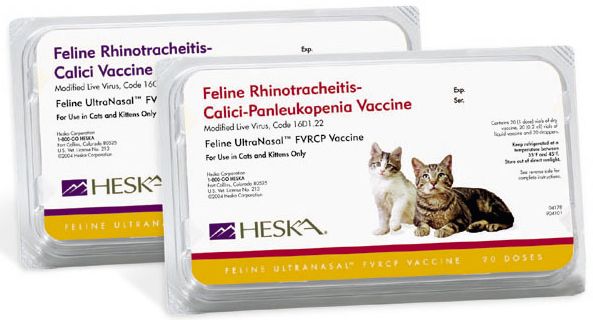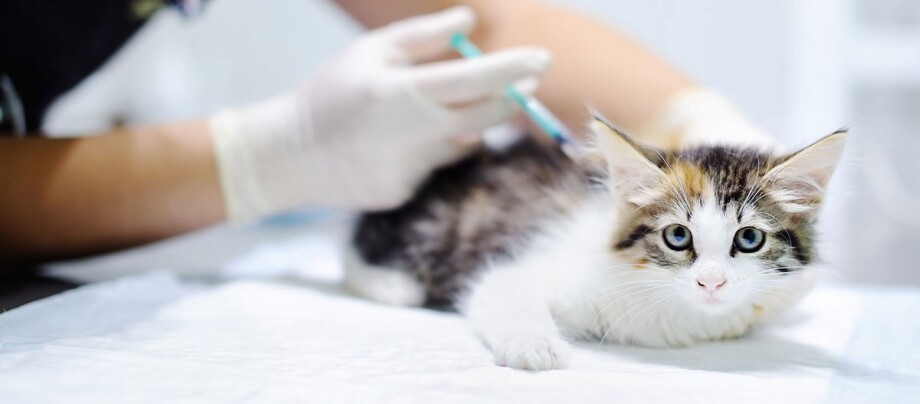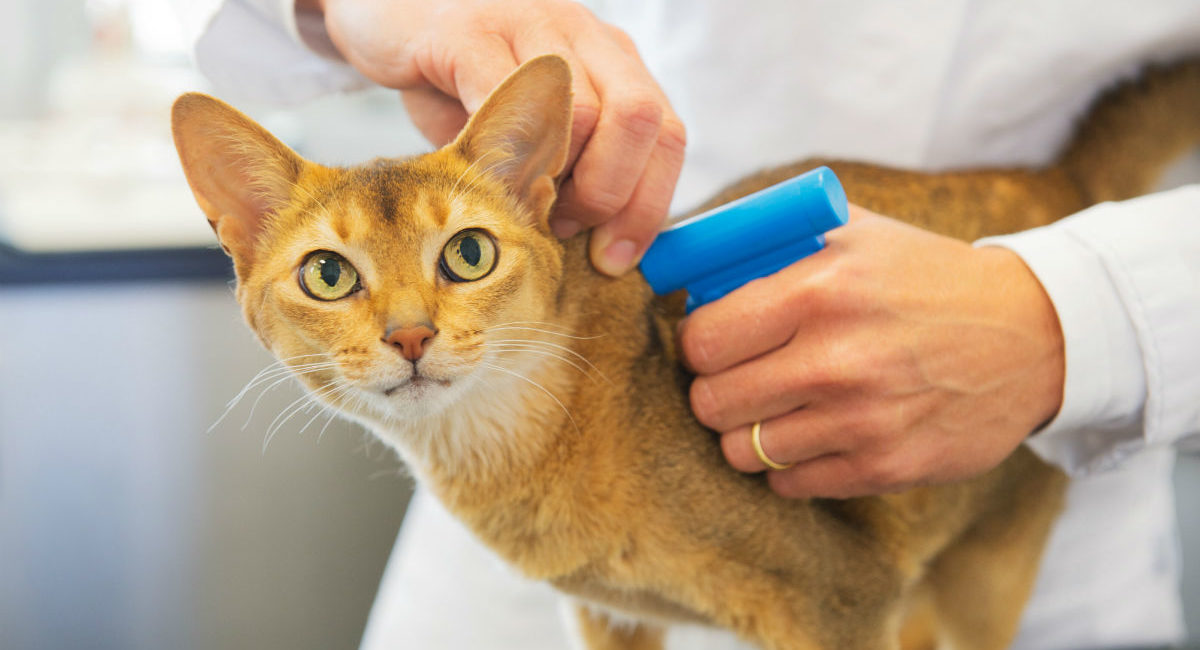Fvrcp Vaccine For Cats
Feline viral rhinotracheitis, calicivirus, and panleukopenia are the three diseases that the FVRCP vaccine for cats protects against (also known as feline distemper).

Typically, it is administered in a course of two to three initial doses, then annually as a booster. The health of cats, especially those who spend time outside or interact with other cats, is thought to be protected by this vaccination.

What is Fvrcp?
FVRCP stands for Feline Viral Rhinotracheitis, Calicivirus, and Panleukopenia. It is a cat combination vaccine that guards against calicivirus, panleukopenia, and feline viral rhinotracheitis, an upper respiratory ailment brought on by feline herpesvirus (also known as feline distemper).
This vaccination, which is often administered in a series of two to three initial doses followed by annual boosters, is thought to be crucial for preserving the health of cats, particularly those who go outside or interact with other cats.
Why do cats need Fvrcp?
Cats need the FVRCP vaccine to protect against three serious and potentially life-threatening diseases:
- Feline viral rhinotracheitis: A highly contagious upper respiratory infection caused by the feline herpes virus.
- Calicivirus: A virus that can cause respiratory and oral infections in cats, including a painful condition called “limp jaw”.
- Panleukopenia: A highly contagious and potentially fatal disease also known as feline distemper.
Cats who receive vaccinations have a better chance of avoiding these illnesses and staying healthy. Vaccinating cats also aids in preventing the spread of these illnesses to other cats, especially in multi-cat households or shelters where numerous cats are housed close together.
Do indoor cats need the Fvrcp vaccine?
Indoor cats can benefit from the FVRCP vaccine, although the risk of exposure to these diseases is generally lower for indoor cats compared to outdoor cats. However, there are still several reasons why indoor cats may need the FVRCP vaccine:
- Disease Outbreaks: If a disease outbreak occurs in a multi-cat household or in a neighborhood, indoor cats may still be at risk of exposure and infection.
- New Cats: If a new cat is introduced into the home, it may carry an infectious disease and pose a risk to other cats.
Fvrcp Vaccine For Cats - Illness: If a cat becomes ill and requires veterinary care or hospitalization, it may be exposed to these diseases in the veterinary clinic or hospital.
- Travel: If a cat travels with its owner, it may be at risk of exposure to these diseases in a new environment.
Ultimately, the decision to vaccinate an indoor cat with the FVRCP vaccine should be made in consultation with a veterinarian, who can assess the individual cat’s risk factors and determine the best course of action.
How often does my cat need the Fvrcp vaccine?
The frequency of the FVRCP vaccine for cats will vary depending on their age, lifestyle, and overall health. Generally speaking:
Kittens: Until they are 16 weeks old, kittens typically receive two to three initial doses, followed by boosters every three to four weeks.
Adult cats: Usually receive annual boosters, though depending on their risk factors, some may need to receive a booster every three years.
For advice on the ideal immunization plan for your particular cat, speak with a veterinarian. If the veterinarian determines that the cat is more likely to be exposed to certain diseases, more regular revaccination may also be advised.
Can an Fvrcp vaccine make a cat sick?
Like any vaccine, the FVRCP vaccine for cats can cause side effects in some cats. The most common side effects are mild and include:
- Soreness or swelling at the injection site
- Mild fever
- Loss of appetite
Within a few days, these side effects typically go away on their own. Rarely, a cat may experience an allergic reaction or a more severe reaction to the immunization. Seek quick veterinarian care if your cat exhibits severe symptoms such as difficulty breathing, swelling of the face or paws, or collapse.
It’s critical to remember that the advantage of receiving the FVRCP vaccine for cats is to protect against the diseases it prevents typically outweigh the dangers of any potential adverse effects. Your vet can assist you in weighing the advantages and disadvantages of vaccination for your particular cat and choosing the best course of action.
How much does an Fvrcp shot cost?
The price of an FVRCP vaccine for cats might differ depending on a number of variables, including the veterinary facility or clinic, region, and extra services offered (such as a comprehensive exam or additional tests). A single FVRCP vaccine typically costs between $30 and $75.
It’s crucial to remember that the price of immunizing a cat is typically lower than the price of treating the diseases that the vaccine prevents. It’s a good idea to ask your vet whether they provide discounts or bundle packages for a variety of vaccines or treatments.

Consider pet insurance as well, which can lower the price of veterinary treatment, including immunizations. Your veterinarian can provide you with additional details about the different types of pet insurance and help you decide if it’s a suitable fit for you and your cat.
How long does cat Fvrcp last?
The FVRCP vaccine for cats can provide immunity for a variety of times, although it often provides immunity for a year. Some cats’ immunity may last longer than others, and some cats could require more regular booster shots.
The state of health, age, and general response to the vaccine of each individual cat are all variables that can alter the length of protection.

It’s crucial to discuss your cat’s unique requirements with your doctor, who may offer advice on the ideal interval between revaccinations based on the specifics of your cat’s case.
It’s also crucial to remember that even if a cat has had all of the recommended vaccinations, it is still possible for the cat to get one of the illnesses the FVRCP vaccine protects against. To greatly lessen the intensity of the sickness and the danger of serious health issues or death, several infections can be prevented with vaccination.
Is it OK not to vaccinate my cat?
Your cat may be more susceptible to developing dangerous and possibly fatal illnesses like panleukopenia, calicivirus, and rhinotracheitis if they are not vaccinated.
While indoor cats may be less likely to be exposed to these illnesses than outdoor cats are, they are nonetheless susceptible to catching them from other animals or their surroundings.
For instance, diseased cats or other animals may spread the infections, or they may spread through contaminated objects like food containers or litter boxes.
Keep in mind that some states, counties, and towns have laws and ordinances requiring that animals be immunized and that some veterinarian facilities may demand proof of immunization before performing services.
Can I give my cat vaccinations myself?
It’s generally not recommended to vaccinate your cat yourself. Vaccination is a medical procedure that should be performed by a licensed veterinarian or veterinary technician.
Veterinarians are trained in the proper administration of vaccines, as well as the recognition and management of any potential side effects or complications.
They can also provide pre- and post-vaccination assessments and advise on the best vaccine protocol for your individual cat based on their health status and lifestyle.
Is Fvrcp the same as Rabies?
FVRCP vaccination and rabies vaccination are not equivalent.
The FVRCP vaccine for cats is a combination vaccine that guards against three diseases in cats: panleukopenia, calicivirus, and feline viral rhinotracheitis, an upper respiratory illness brought on by a herpesvirus (a highly contagious and potentially fatal disease).
The Rabies vaccine, on the other hand, is a unique vaccination that offers protection against rabies, a viral disease that can be spread by animal bites or scratches to people and other animals.
Cats must be vaccinated against rabies according to the law in many regions and nations since it is a severe public health risk.
What are the 3 vaccines for cats?
The three common vaccines for cats are:
- Feline Rhinotracheitis Virus (FHV) and Feline Calicivirus (FCV) Vaccine: This vaccine protects against two highly contagious respiratory viruses that can cause severe upper respiratory infections in cats. FHV and FCV can cause symptoms such as sneezing, runny nose, and eye discharge, as well as more serious complications like pneumonia.
- Feline Panleukopenia (FPV) Vaccine: This vaccine protects against a highly contagious and often fatal viral disease that causes vomiting, diarrhea, and severe dehydration.
- Feline Leukemia Virus (FeLV) Vaccine: This vaccine protects against a virus that can cause cancer and weaken a cat’s immune system. The virus is primarily spread through saliva, so it’s important for cats that are frequently around other cats, such as those that live in multi-cat households or are allowed outside, to be vaccinated.
It’s important to consult with a veterinarian to determine which vaccines are recommended for your cat, based on their lifestyle and risk factors.
Can rabies and Fvrcp be given together?
Yes, it is possible to administer rabies and FVRCP (Feline Viral Rhinotracheitis, Calicivirus, and Panleukopenia) vaccines simultaneously. Many veterinarians deliver both vaccines during the same office visit. These vaccines are frequently given as combo doses.
The simultaneous administration of both vaccines offers defense against several diseases and lessens the number of trips a cat needs to make to the clinic.
However, depending on the cat’s age, health, and exposure risk, the precise time and frequency of vaccines may vary. As a result, it’s vital to speak with a veterinarian to come up with the best plan for your cat.
Fvrcp vaccine for cats side effects
Like all vaccines, the FVRCP (Feline Viral Rhinotracheitis, Calicivirus, and Panleukopenia) vaccine can cause side effects in some cats. These side effects are generally mild and temporary, and may include:
- Pain or swelling at the injection site
- Mild fever
- Loss of appetite
- Decreased energy or activity level
- Temporary lethargy or sleepy behavior
More severe side effects, such as an allergic reaction or the emergence of a vaccine-associated sarcoma, can occasionally take place (a type of cancer). These severe adverse effects, however, are incredibly rare and typically happen when a vaccine is administered incorrectly.
If your cat exhibits any unusual symptoms or changes in behavior following a vaccine, it’s crucial to call your veterinarian. They can assist in determining whether the symptoms are linked to the vaccination and, if necessary, can offer the necessary care.





